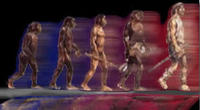
For those who are following the current hubub over some comments made by Cardinal Schönborn on evolution and the Church, here is an excellent interview on the issue from Fr. Edward Oakes, SJ: Part 1, and Part 2.
An excerpt :
For one thing, the Church has no "doctrine" on evolution, any more than it has a doctrine on tectonic plates or a magisterial teaching on how human consciousness arises from the electrical firings inside the neurology of the brain. These matters are both beyond the competence of the magisterium and are irrelevant to salvation, anyway.
Secondly, even if the magisterium did have an official teaching on evolution, it does not officially revise its "views" on matters of science by having a cardinal, however "leading," writing an article "in propria persona" -- on his own behalf -- and using an op-ed piece in a secular newspaper to boot.
That said, I believe that Cardinal Schönborn's essay "Finding Design in Nature" in the July 7 issue of the Times makes a valid point, roughly the reverse side of the coin of what Pope John Paul II said in his now-famous letter to the Pontifical Academy of Sciences in October of 1996.
John Paul said at the time that "evolution" -- which, as Cardinal Schönborn rightly notes, the Holy Father left undefined -- can no longer be considered merely a "hypothesis" because so much data have now come in to confirm the theory.
The problem is that this very short letter brought some misinterpretations of its own in its wake -- because of the obnoxious way some Darwinians like to hijack the word "evolution" for their own atheistic purposes -- and it is those false conclusions, as I see it, that the cardinal was trying to warn against.
But, no, I do not see the cardinal's quite legitimate warning as a "new chapter in the evolution-vs.-creationism debate."
First of all, if "creationism" means six-day creation as a few Christian fundamentalists still hold, then there is no chance in the world that the Catholic Church will join that cause. But "creationism" can also refer to the total ontological dependence of the universe on God's creative act of will, and nothing in the theory of evolution can threaten that essential doctrine of the Catholic faith.
Remember that, according to St. Thomas Aquinas, even if the world happens to be temporally eternal, such an eternity of time would not undermine the created contingency of the world, utterly dependent on God's free decision to create it.
Another excellent read on the issue is found here... an interview of Professor Nicola Cabibbo, president for the past 12 years of the Pontifical Academy of Sciences.
An excerpt :
NCR: What did you think of The New York Times article by Cardinal Christoph Schönborn of Vienna on evolution?Good stuff! Go read the rest and copy it to your harddrive!
Cabibbo: Two things struck me, one positively and the other negatively. Positively, it opens a very interesting discussion. But I cannot agree with the way he handled the address of John Paul II to the Pontifical Academy of Sciences in 1996. I don't know if the problem was in a bad translation from German, but he calls it "vague and rather unimportant." I've never considered it that way, in fact I have always considered it very important. Not only for the now famous statement, that evolution is "more than a hypothesis," but also for what comes next: "It is indeed remarkable that this theory has been progressively accepted by researchers, following a series of discoveries in various fields of knowledge. The convergence, neither sought nor fabricated, of the results of work that was conducted independently is in itself a significant argument in favor of this theory," the Pope said. With these words the Pope demonstrated a clear understanding of the scientific method, on how an hypothesis can be transformed into a widely accepted fact. This allocution is in fact a very articulated expression of the thought of the late John Paul II.
No comments:
Post a Comment